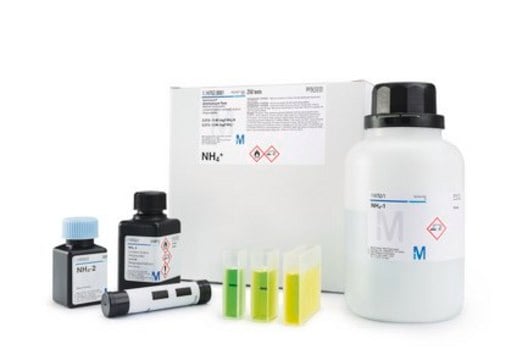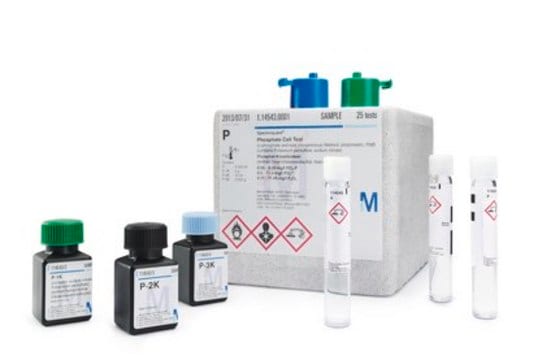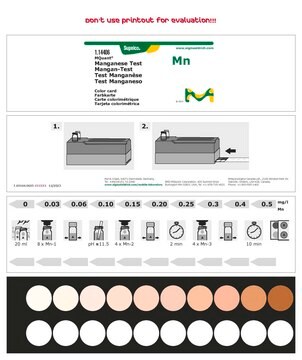1.00816
Manganese Test, photometric
photometric, 0.10-5.00 mg/L (Mn), Spectroquant®
About This Item
Recommended Products
Product Name
Manganese Cell Test, photometric, 0.10-5.00 mg/L (Mn), Spectroquant®
product line
Spectroquant®
Quality Level
usage
sufficient for 25 tests
specific analyte(s)
manganese
measuring range
0.10-5.00 mg/L (Mn)
technique(s)
photometry: suitable
compatibility
for use with Spectroquant® Move 100
for use with Spectroquant® Nova 60 A
for use with Spectroquant® Prove 100
for use with Spectroquant® Prove 300
for use with Spectroquant® Prove 600
detection method
photometric (Formaldioxime)
storage temp.
15-25°C
General description
The method is analogous to DIN 38406-2.
This Spectroquant® Manganese Cell Test allows the accurate quantification of the manganese(II) ions content in aqueous samples.
Method applied: In alkaline solution manganese(II) ions react with an oxime to form a red-brown complex which is determined photometrically.
The Spectroquant®Cell Tests come with prefilled 16 mm round cells and all the required reagents to perform the analysis according to the instruction leaflet provided.
All Spectroquant® Cell and Reagent Test Kits are equipped with the unique Live ID (2D barcode) which allows seamless method recognition and contains essential information such as lot number, expiry date, and automatic calibration updates.
Legal Information
Signal Word
Danger
Hazard Statements
Precautionary Statements
Hazard Classifications
Acute Tox. 3 Oral - Aquatic Acute 1 - Aquatic Chronic 2 - Carc. 1B - Eye Dam. 1 - Met. Corr. 1 - Muta. 2 - Skin Corr. 1B - Skin Sens. 1 - STOT RE 2 Oral - STOT SE 3
Target Organs
Respiratory system, spleen
Storage Class Code
6.1C - Combustible, acute toxic Cat.3 / toxic compounds or compounds which causing chronic effects
WGK
WGK 3
Certificates of Analysis (COA)
Search for Certificates of Analysis (COA) by entering the products Lot/Batch Number. Lot and Batch Numbers can be found on a product’s label following the words ‘Lot’ or ‘Batch’.
Already Own This Product?
Find documentation for the products that you have recently purchased in the Document Library.
Protocols
Photometric determination subsequent to acid mineralisation
Our team of scientists has experience in all areas of research including Life Science, Material Science, Chemical Synthesis, Chromatography, Analytical and many others.
Contact Technical Service





